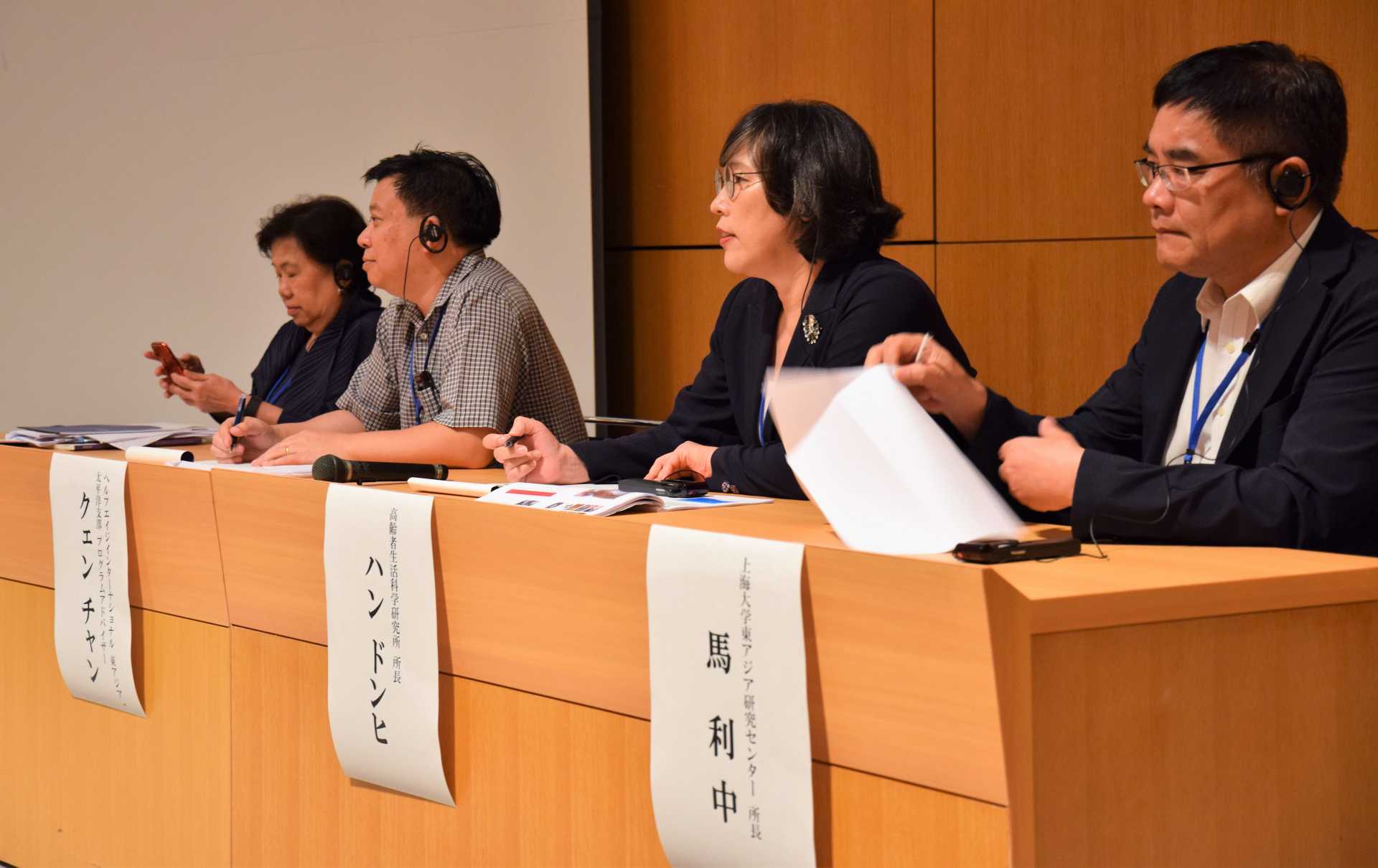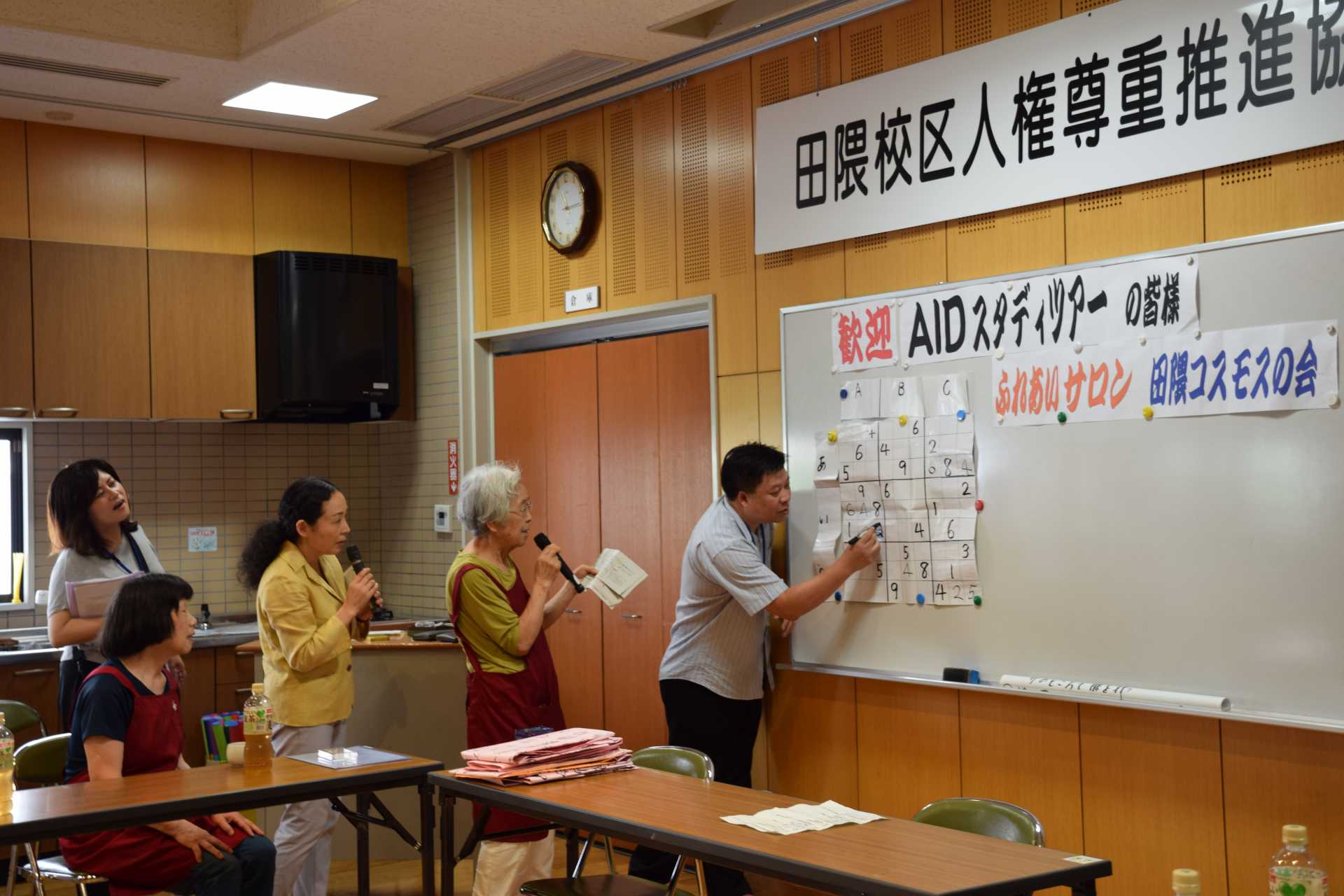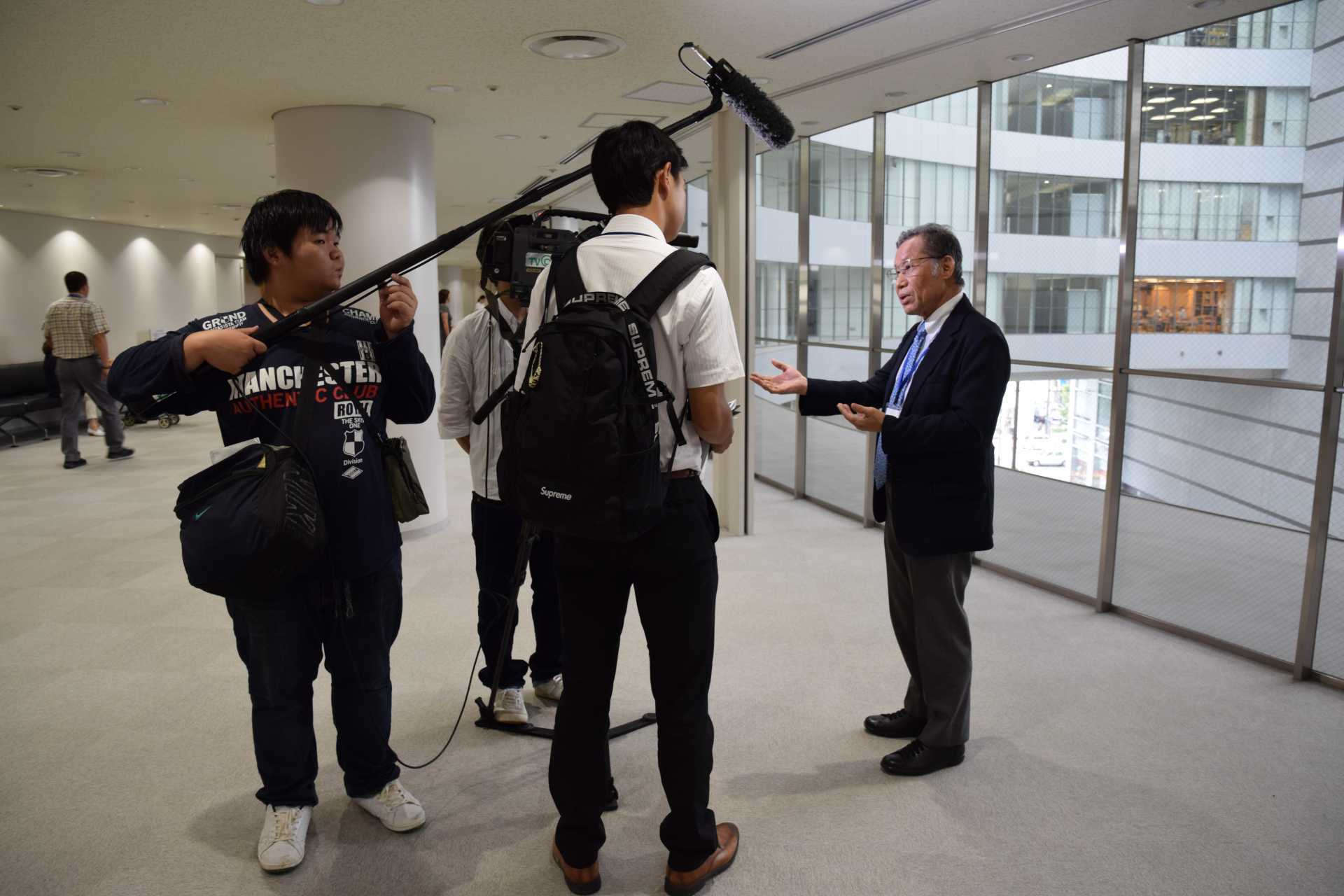Asia Peace Initiatives Program
Thinking about Active Aging (2/2)
The 2nd Asia Impact Dialogue (Fukuoka)
June 7, 2019
5 Min. Read
Since the opening of the support center, the number of job offers for elderly people has risen to 5,679 at 2,546 companies over the past six years, and in particular, the prefecture has partnered with convenience stores for the first time in Japan in order to promote employment of the elderly. Moreover, the center has urged companies to abolish or extend their retirement age and otherwise continue the employment of elderly individuals, and as a result 536 companies have indeed decided to abolish or extend the retirement age.
Ms. Noda hosts corporate seminars where she highlights the benefits of hiring elderly workers, and provides training in the latest in childcare knowledge and other topics, such that elderly individuals can play an active role in the area of child care. At the end of their training, the elderly individuals receive a "Childcare Meister" certificate.
Sachiko Managi, the Regional Welfare Manager at Fukuoka City Council of Social Welfare, noted that many of the leaders of community-based welfare activities are “lively elderly people,” and that "Welfare activities are linked to preventative care, and the elderly are an important social resource in our area."
The "Fukuoka City Arakan Festa R60 Club" is a club mainly for persons around 60 years old ("arakan" is an abbreviation of two words, and means "around sixty calendar years"). Speaking on behalf of the club, Mr. Osami Ide revealed that one function of the club is to consider ways that its members can pass the years to come, and that the club hosts a number of events and experience programs that could potentially lead to work or local activities for the club members. Mr. Toyofumi Koga of the Fukuoka City Silver Human Resources Center explained the current situation with regards to employment of the elderly, as well as the efforts being made to provide the elderly with opportunities to work. “We are a highly educated society, so even when a job is available as a cleaner, nobody applies for it. The issue is how to fill the gap between the number of job offers and those actually applying for the jobs," he said.
Ms. Noda hosts corporate seminars where she highlights the benefits of hiring elderly workers, and provides training in the latest in childcare knowledge and other topics, such that elderly individuals can play an active role in the area of child care. At the end of their training, the elderly individuals receive a "Childcare Meister" certificate.
Sachiko Managi, the Regional Welfare Manager at Fukuoka City Council of Social Welfare, noted that many of the leaders of community-based welfare activities are “lively elderly people,” and that "Welfare activities are linked to preventative care, and the elderly are an important social resource in our area."
The "Fukuoka City Arakan Festa R60 Club" is a club mainly for persons around 60 years old ("arakan" is an abbreviation of two words, and means "around sixty calendar years"). Speaking on behalf of the club, Mr. Osami Ide revealed that one function of the club is to consider ways that its members can pass the years to come, and that the club hosts a number of events and experience programs that could potentially lead to work or local activities for the club members. Mr. Toyofumi Koga of the Fukuoka City Silver Human Resources Center explained the current situation with regards to employment of the elderly, as well as the efforts being made to provide the elderly with opportunities to work. “We are a highly educated society, so even when a job is available as a cleaner, nobody applies for it. The issue is how to fill the gap between the number of job offers and those actually applying for the jobs," he said.

The experts and practitioners from Asia expressed their views at the symposium on the current conditions and problems of Asian countries
In response, Ms. Thelma Kay, the first speaker of the experts and practitioners from Asian countries and a former director of the Social Development Department of the United Nations Asia-Pacific Economic and Social Commission (UNESCAP), gave an overview of the situation in Asia as a whole, noting that Korea, Singapore, Thailand, and other countries have raised the retirement age, and many countries have established an “Active Aging Center.” As such, efforts are being made around Asia to increase employment opportunities for the elderly.
According to Mr. Quyen Ngoc Tran (Thailand), Program Advisor for the East Asia and Pacific Branch of Help Age International, “Japan is leading the way in aging and other countries are trying to follow. We can learn a lot from Japan, in terms of the country's successes, but also from its failures." In Cambodia, Vietnam, the Philippines and other countries, old people are often perceived as a burden. One thing we can learn from Japan is to consider elderly people as a group with various abilities—Asian countries will need to change their understanding of elderly people in this regard. He went on to point out that in Vietnam, the pension payment is just $12 a month, and that “It is important to work rather than relying solely on a pension. If you work you can increase your income and the shift towards elderly people working is another thing we can learn about from Japan.”
Donghee Han, Director of the Research Institute of Science for Better Living of the Elderly in Korea, said that “Korea is becoming a more aged society, and every year there is decrease in the working population and in the number of young people, while the number of elderly people is increasing. She stressed the gravity of the current situation, noting that "The poverty rate and debt ratio of the elderly are both increasing.” She went on to describe how Korea is trying to close the digital gap by giving elderly people the skills to use elements of information technology such as personal computers and the internet. The country then tries to pair these IT-literate individuals with potential employers, thus increasing employment opportunities among the elderly.
Lizhong Ma, Head of the Center for East Asian Studies at Shanghai University, noted that “China's economic growth has improved the national standard of living, and the population is aging accordingly. The parents of children born under China's One Child Policy (a policy designed to reduce the population) are now entering old age, and have few descendants to support them. Taking action against aging is becoming increasingly important.” Ma went on to say that in January this year in China, a long-term care insurance system based on Japan's experience began in 15 cities including Shanghai. Through this system, doctors, professors and professional technicians who have left work on the front lines take part in medical care, education, urban planning, pastoralism, and other activities. “I hope that we will study each other's ideas and knowledge in order to overcome aging, and that we will take advantage of Japan's experiences in combating aging,” he said.
According to Mr. Quyen Ngoc Tran (Thailand), Program Advisor for the East Asia and Pacific Branch of Help Age International, “Japan is leading the way in aging and other countries are trying to follow. We can learn a lot from Japan, in terms of the country's successes, but also from its failures." In Cambodia, Vietnam, the Philippines and other countries, old people are often perceived as a burden. One thing we can learn from Japan is to consider elderly people as a group with various abilities—Asian countries will need to change their understanding of elderly people in this regard. He went on to point out that in Vietnam, the pension payment is just $12 a month, and that “It is important to work rather than relying solely on a pension. If you work you can increase your income and the shift towards elderly people working is another thing we can learn about from Japan.”
Donghee Han, Director of the Research Institute of Science for Better Living of the Elderly in Korea, said that “Korea is becoming a more aged society, and every year there is decrease in the working population and in the number of young people, while the number of elderly people is increasing. She stressed the gravity of the current situation, noting that "The poverty rate and debt ratio of the elderly are both increasing.” She went on to describe how Korea is trying to close the digital gap by giving elderly people the skills to use elements of information technology such as personal computers and the internet. The country then tries to pair these IT-literate individuals with potential employers, thus increasing employment opportunities among the elderly.
Lizhong Ma, Head of the Center for East Asian Studies at Shanghai University, noted that “China's economic growth has improved the national standard of living, and the population is aging accordingly. The parents of children born under China's One Child Policy (a policy designed to reduce the population) are now entering old age, and have few descendants to support them. Taking action against aging is becoming increasingly important.” Ma went on to say that in January this year in China, a long-term care insurance system based on Japan's experience began in 15 cities including Shanghai. Through this system, doctors, professors and professional technicians who have left work on the front lines take part in medical care, education, urban planning, pastoralism, and other activities. “I hope that we will study each other's ideas and knowledge in order to overcome aging, and that we will take advantage of Japan's experiences in combating aging,” he said.

Participants from Thailand who visited “The Tanuki Cosmos Association” and played sudoku as a means of preventative nursing care (right photo)

Shuichi Ono, President of the Sasakawa Peace Foundation, responding to local television interviews at the symposium venue. The media expressed great interest in issues surrounding aging.
At the closed-door expert meeting held on the following day, further discussions took place on the importance of intergenerational exchange and lifelong learning. On the 29th, prior to the two-day symposium, the participants from overseas experienced the unique efforts and activities of the “Taguma Cosmos Club,” “Hakozaki Cafe,” and “Fukuoka City Arakan Festa R60 Club” in Fukuoka City.
The Sasakawa Peace Foundation held the first Asia Impact Dialogue with the Center for Southeast Asian Studies in Singapore this February, and this year's dialogue was the second such event. At the next event in Vietnam in March next year, SPF will hold further discussions on measures to promote active aging.
The Sasakawa Peace Foundation held the first Asia Impact Dialogue with the Center for Southeast Asian Studies in Singapore this February, and this year's dialogue was the second such event. At the next event in Vietnam in March next year, SPF will hold further discussions on measures to promote active aging.